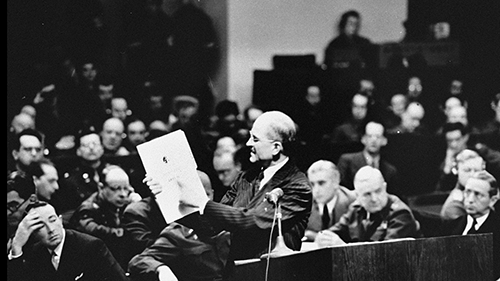Robert Storey: A Legacy of Humanitarian Justice
This year in history: an exchange alumnus served at the center of the Nuremberg Trials.
col._robert_g._storey_image.png
 Photo Credit: United States Holocaust Memorial Museum, courtesy of National Archives and Records Administration, College Park. Public domain.
Photo Credit: United States Holocaust Memorial Museum, courtesy of National Archives and Records Administration, College Park. Public domain.
This year in history, at the center of the Nuremberg Trials, an Exchange Alumnus served as one of the prosecutors. His name? Robert G. Storey, a veteran of World War I and II, and a distinguished lawyer.
This year, 2020, marks the 75th anniversary of the end of World War II and of Nuremberg, a series of tribunals held after the war to prosecute Nazi leaders for crimes against humanity. Four Allied countries -- France, the United States, the Soviet Union, and the United Kingdom -- formed the backbone for the tribunal; they contributed high-ranking judges and prosecution teams to the trials, including Storey and his prosecutor colleagues.
Storey served as executive trial counsel for Supreme Court Justice Robert H. Jackson. His work and that of other Allied legal teams prosecuting high-ranking Nazi and Gestapo leaders helped set the precedent for modern international and human rights law.
Their efforts uncovered 3,000 tons of evidence that documented the Nazis’ war crimes and atrocities committed throughout the war.
For his contributions to the development of humanitarian and international law during the Nuremberg trials, Storey was awarded the U.S. Medal of Freedom and French Legion of Honor.
Following the trials, Storey continued his work in expanding the practice of international law through several notable leadership roles, starting with serving as the dean of the S.M.U. Law School in 1947 and developing the school into an “international legal center.” He founded the Southwestern Legal Association in 1947 and served as its President until 1972. During this time, he also held the position of President in several prominent organizations, including the State Bar from 1948-1949; the American Bar Association from 1952-1953; and, the Inter-American Bar Association from 1954-1956.
Robert G. Storey died on January 16, 1981, leaving behind a legacy of justice, peace, and integrity that lives on through the practice and ideals of modern international and humanitarian law today.
This story was contributed by Julia M. Stewart, who is doing a Virtual Student Federal Service (VSFS) internship, in the Office of Alumni Affairs, Bureau of Educational and Cultural Affairs, at the U.S. Department of State.
